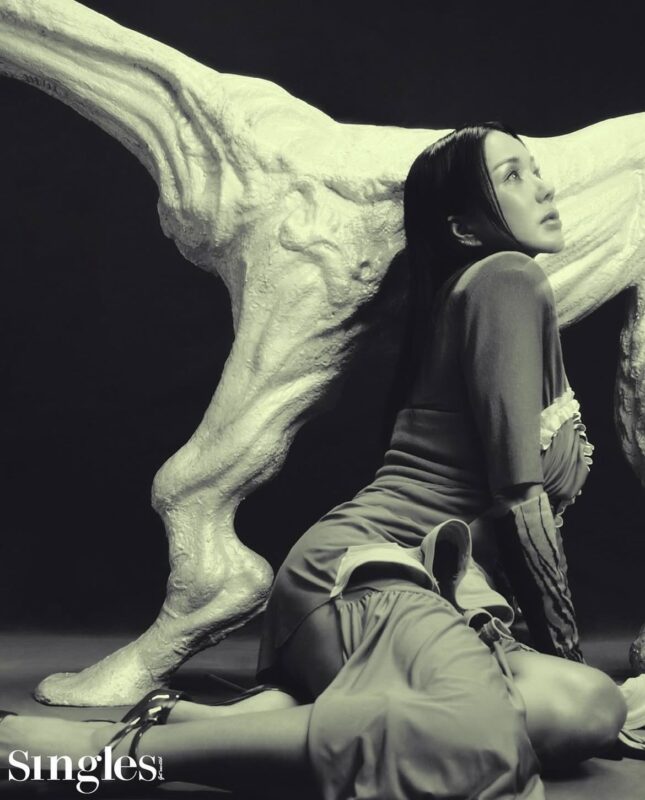Uhm Jung-hwa is one of South Korea’s most celebrated singers and actresses, often hailed as a cultural icon and the country’s very own “Korean Madonna” for her trailblazing influence in music and film over several decades. Her dynamic career, marked by constant reinvention and artistic excellence, has earned her a devoted fanbase and critical acclaim. However, in 2010, Uhm faced a life-changing challenge when she was diagnosed with thyroid cancer—a pivotal moment that tested her resilience both personally and professionally.

This article explores her courageous battle against the disease, highlighting not only the medical struggles she overcame but also the inspiring strength and determination that fueled her remarkable comeback. Through her story, readers will find hope and inspiration in the face of adversity.
What Are the Defining Moments in Uhm Jung-hwa’s Legendary Career?
Uhm Jung-hwa’s career is a testament to unparalleled versatility and enduring influence, solidifying her status as a true Korean cultural icon, famously dubbed the “Korean Madonna.” Bursting onto the music scene in the early 1990s, she quickly revolutionized K-pop with her bold concepts, innovative fashion, and powerful stage presence, continually pushing boundaries for female artists. Hits like “Poison,” “Invitation,” and “Festival” cemented her as a dance-pop queen, earning her numerous music awards and establishing trends that reverberated throughout the industry.
Beyond her musical prowess, Uhm Jung-hwa simultaneously built a formidable acting career, showcasing remarkable depth and range. From her early roles in television dramas to critically acclaimed performances in films like Marriage Is a Crazy Thing, Singles, and Dancing Queen, she demonstrated an innate ability to embody diverse characters, seamlessly transitioning between comedic lightness and dramatic intensity.
This dual success in both music and acting is a rarity, distinguishing her as an artist who has mastered multiple facets of the demanding entertainment world. Her consistent ability to reinvent herself, remain relevant across generations, and maintain a high level of artistic output over several decades underscores her extraordinary longevity and cemented her legacy as a trailblazer and a living legend in Korean entertainment.
How Was Thyroid Cancer Discovered in Uhm Jung-hwa?
In 2010, during a routine medical check-up, Uhm Jung-hwa received life-altering news: she was diagnosed with thyroid cancer. The diagnosis came as a profound shock to the celebrated singer and actress, who had always been admired for her vibrant energy and strong public persona. Faced with the unexpected reality of a serious illness, Uhm initially grappled with fear and uncertainty, worrying not only about her health but also about the impact the diagnosis would have on her flourishing career.
The revelation marked a pivotal turning point both personally and professionally. On a personal level, Uhm was confronted with the daunting challenge of fighting an invisible enemy that threatened her well-being and voice—her most vital instrument. Professionally, the diagnosis forced her to pause and reconsider her demanding schedule, knowing that treatment and recovery would require time away from the spotlight. The uncertainty cast a shadow over her future in entertainment, making this period one of profound introspection and resilience as she prepared to face the difficult path ahead.
What Treatment Challenges Did Uhm Jung-hwa Face During Her Cancer Journey?
In response to her thyroid cancer diagnosis, Uhm Jung-hwa underwent surgery to remove the cancerous thyroid tissue—a critical and potentially life-saving procedure. While the surgery was successful in addressing the cancer, it was accompanied by a severe and unexpected complication: paralysis of part of her vocal cords. This vocal cord paralysis left her nearly unable to speak, drastically affecting the very tool that had defined her career as a singer and performer.
The loss of her voice was both a physical and emotional ordeal. For months, Uhm struggled with basic communication, grappling with frustration and fear about whether she would ever regain her singing ability. The silence was daunting for someone whose life had been centered around music and expression. The recovery process demanded intense rehabilitation, patience, and mental fortitude.

In interviews reflecting on this difficult period, Uhm Jung-hwa has spoken candidly about the immense challenges she faced. She described the experience as one of the most painful in her life, saying that losing her voice felt like losing a part of her identity. Yet, amidst the hardship, she emphasized that this struggle taught her resilience and deepened her appreciation for life and her craft. Her openness about vulnerability and recovery has since inspired many, shedding light on the harsh realities behind the scenes of celebrity and highlighting the strength needed to overcome such profound obstacles.
How Did Uhm Jung-hwa Rehabilitate and Return to the Music Scene After Cancer?
After her thyroid cancer surgery in 2010, Uhm Jung-hwa faced the daunting challenge of vocal cord paralysis, which left her nearly unable to speak. Determined not to let this setback end her career, she embarked on an intensive and prolonged rehabilitation journey to restore her voice. Her recovery process involved dedicated vocal therapy and constant practice, targeting the strengthening and retraining of her impaired vocal cords. This arduous program demanded immense patience and perseverance, as progress was slow and often frustrating.
Despite being told by doctors that singing again might be impossible, Uhm’s unwavering determination fueled her gradual return to vocal function. She described her comeback as a testament to courage and strong will, emphasizing that having the right mindset is essential to overcoming seemingly insurmountable obstacles.
In 2016, after years of relentless rehabilitation, Uhm Jung-hwa made a remarkable return to the music scene. Her comeback was met with widespread admiration, as fans and critics alike celebrated not only her restored vocal abilities but also the emotional depth she brought to her performances, enriched by her journey through hardship. The public response was overwhelmingly positive, highlighting a renewed appreciation for her artistry and resilience. This triumphant return solidified her legacy as a symbol of strength and hope, inspiring many both within the entertainment industry and beyond.
How Has Uhm Jung-hwa’s Legacy Shaped Life Beyond Entertainment?
Uhm Jung-hwa’s courageous battle with thyroid cancer has significantly raised public awareness about the disease in South Korea and beyond. By openly sharing her experience—especially her nerve damage and long recovery period—she has shed light on the challenges many patients face but seldom discuss publicly, helping to destigmatize thyroid cancer and inspire early detection through routine check-ups. Her story resonated widely when she revealed the emotional and physical hurdles she overcame, emphasizing the importance of resilience and hope in facing cancer.
As a beloved cultural icon known as the “Korean Madonna,” Uhm has become a symbol of strength and perseverance, not only within South Korea but also among international fans familiar with her music and acting career. Her transparency about vulnerability and recovery has deepened public respect and created a powerful narrative of overcoming adversity that transcends entertainment. This has encouraged many to approach cancer with openness and courage.

Photo: Uhm Jung hwa Instagram account @umaizing
While there is limited public information on specific charitable activities she personally supports, her impact lies strongly in advocacy through visibility and storytelling. By using her platform to discuss her cancer journey candidly—especially during appearances on shows like “Yoo Hee Yeol’s Sketchbook” and “Win Win”—she has contributed indirectly to cancer awareness and patient empowerment. Her legacy extends beyond her artistic achievements, embodying hope and resilience for countless individuals facing similar battles.
How Has Uhm Jung-hwa Championed Women’s Empowerment Throughout Her Career
Uhm Jung-hwa has been widely recognized as a pioneering figure promoting female independence and empowerment in South Korea’s entertainment industry. Dubbed the “Korean Madonna,” she broke away from traditional portrayals of women in Korean pop culture by embracing boldness, confidence, and self-expression both on and off the stage. Early in her career during the 1990s, Uhm challenged the conventional image of women as passive and submissive, instead embodying a strong, sensual, and assertive persona that opened doors for future female artists like Lee Hyori and members of 2NE1 to express themselves freely without restraint.
Her screen roles further reinforced this image of the “New Korean Woman” — a concept explored in academic research that highlights Uhm as a pioneer portraying modern Korean femininity that resists conventional expectations around marriage, motherhood, and female subservience. Rather than fitting into polarized “good” or “bad” female stereotypes common in Korea’s neo-Confucian society, Uhm’s characters depict women exercising individual choice, autonomy, and complexity.
Uhm’s public battle with thyroid cancer added another powerful layer to her role as an emblem of strength and self-empowerment for women. Facing vocal cord paralysis and the threat to her career as a singer, she persevered with relentless rehabilitation, embodying courage and resilience in the face of adversity. Her openness about vulnerability and recovery challenged societal stigmas around illness and womanhood, inspiring countless fans and women confronting their own struggles to find their voices—both literally and metaphorically.
Through decades of reinvention and refusal to be defined by age, illness, or stereotypes, Uhm Jung-hwa continues to embody and promote female empowerment—a legacy that extends beyond entertainment into cultural and social influence, inspiring women across generations in Korea and internationally.
You Can Also Read Kim Woo-bin and Nasopharyngeal Cancer: How He Went Against, How He Survived, and More by Oncodaily

What Are the Main Risk Factors for Developing Thyroid Cancer?
Thyroid cancer risk factors can increase your chances of developing the disease. While having one or more risk factors doesn’t guarantee thyroid cancer, recognizing them can aid in early detection and prevention efforts.
Gender and Age
This type of cancer is significantly more common in women than in men, with women being about three times more likely to develop the condition. The disease can affect people of any age, but it is most commonly diagnosed between the ages of 30 and 60, particularly in women.
Family History and Genetics
A family history of thyroid cancer or certain genetic conditions can increase your risk. Key inherited conditions linked to thyroid cancer include:
- Multiple Endocrine Neoplasia type 2 (MEN2): Increases the risk of medullary thyroid cancer.
- Familial Adenomatous Polyposis (FAP): Often associated with papillary thyroid cancer.
- Cowden Syndrome: Linked to papillary and follicular thyroid cancer.
- Carney Complex: A rare condition that can lead to early-onset thyroid cancers.
If there is a history of these genetic syndromes in your family, consider genetic counseling and testing to assess your risk.
Radiation Exposure
Radiation exposure, especially during childhood, is a well-known risk factor for thyroid cancer. Individuals who received radiation treatments for other medical conditions early in life have a higher chance of developing thyroid cancer later on. Similarly, those exposed to nuclear fallout, such as during the Chernobyl disaster, are at increased risk. Even though the radiation from routine childhood imaging—like CT scans or X-rays—is much lower, frequent exposure over time may still contribute slightly to thyroid cancer risk.
Body Weight
Body weight can also influence the likelihood of developing thyroid cancer. Research has shown that being overweight or obese increases the risk, with the chances rising alongside a person’s body mass index (BMI). Obesity appears to be a contributing factor to both the development and progression of thyroid cancer, though the exact reasons for this link are still being studied.
Iodine Levels in Diet
The amount of iodine in a person’s diet plays a role in thyroid health and cancer risk. Low iodine intake has been associated with a higher chance of developing follicular thyroid cancer, while very high iodine levels may increase the risk of papillary thyroid cancer. In countries like the United States, where iodized salt is commonly used, iodine deficiency is rare. However, it can still occur in some regions or among people with restricted diets.
You Can Also Read Thyroid Cancer: Symptoms, Causes, Stages, Diagnosis, and Treatment by OncoDaily

What Is the Outlook for People With Different Types of Thyroid Cancer?
According to ASCO and related authoritative sources, the prognosis of thyroid cancer varies significantly depending on the type and stage of the disease:
- Differentiated Thyroid Cancer (DTC), which includes papillary and follicular types, generally has an excellent prognosis. Patients with radioactive iodine–sensitive DTC enjoy high survival rates. For those with radioiodine-refractory differentiated thyroid cancer (RAIR-DTC), the prognosis is worse, especially if metastatic, with median 5-year disease-specific survival rates around 60–70%. Early identification and intervention improve outcomes.
- Medullary Thyroid Cancer (MTC) has a more variable prognosis. Survival depends heavily on the stage at diagnosis: 10-year survival rates are approximately 100% for stage I, 93% for stage II, 71% for stage III, and drop to about 21% for stage IV. Genetic factors and extent of spread influence survival.
- Anaplastic Thyroid Cancer (ATC) is a rare and highly aggressive form with a poor prognosis. Median survival is around 5–6 months, with 1-year survival approximately 20%. Long-term survival beyond 2 years is rare but possible in a small subset. Prognosis is better for patients with resectable disease and multimodal therapy (surgery, radiation, systemic treatment). Age, tumor stage, and extent of spread are important prognostic factors.
You Can Also Read Thyroid Cancer Cure Rate: What Patients Should Know in 2025 by Oncodaily.
Overall, prognosis depends critically on cancer type, stage at diagnosis, and whether it is responsive to standard treatments like radioactive iodine. Early-stage differentiated thyroid cancers offer an excellent outlook, while advanced and anaplastic types carry significantly worse survival rates.
Written by Aharon Tsaturyan, MD.
FAQ
When was Uhm Jung-hwa diagnosed with thyroid cancer?
She was diagnosed in 2010 during a routine medical check-up.
What type of thyroid cancer did Uhm Jung-hwa have?
Uhm Jung-hwa was diagnosed with thyroid cancer; the specific subtype is most commonly differentiated thyroid cancer (papillary or follicular), though exact subtype details are generally not publicly specified.
How did thyroid cancer affect Uhm Jung-hwa’s career?
The cancer and subsequent surgery caused vocal cord paralysis, severely impacting her ability to speak and sing for many months, forcing a temporary hiatus from her career.
What treatment did Uhm Jung-hwa undergo for her thyroid cancer?
She underwent surgery to remove the cancerous thyroid tissue, followed by intensive rehabilitation for vocal cord paralysis.
How did Uhm Jung-hwa recover her voice after surgery?
Through years of dedicated vocal therapy and rehabilitation, involving vocal exercises and patience, she gradually regained speaking and singing ability.
What inspired Uhm Jung-hwa during her cancer battle?
Her determination, resilience, and mindset focused on overcoming adversity played crucial roles in her recovery and comeback.
Has Uhm Jung-hwa supported thyroid cancer awareness?
While she has not been publicly linked to formal charity partnerships, she has raised awareness by openly sharing her experience in interviews and media appearances.
What are common symptoms of thyroid cancer?
Symptoms may include a lump in the neck, changes in voice, difficulty swallowing, and neck pain, though many cases are found incidentally via imaging.
What causes thyroid cancer?
Exact causes are unclear but risk factors include radiation exposure, family history, genetic syndromes, gender (more common in women), and iodine intake.
How is thyroid cancer diagnosed?
Diagnosis usually involves ultrasound imaging, fine-needle aspiration biopsy, blood tests, and sometimes molecular testing.
What are the types of thyroid cancer?
Common types include papillary, follicular, medullary, and anaplastic thyroid cancers, each varying in aggressiveness and prognosis.
What is the prognosis for thyroid cancer?
Differentiated thyroid cancers (papillary, follicular) generally have excellent survival rates; medullary and anaplastic types have worse outcomes.
How is thyroid cancer treated?
Treatment often involves surgical removal of the thyroid gland, radioactive iodine therapy, hormone replacement, and in some cases, targeted therapies or external radiation.


